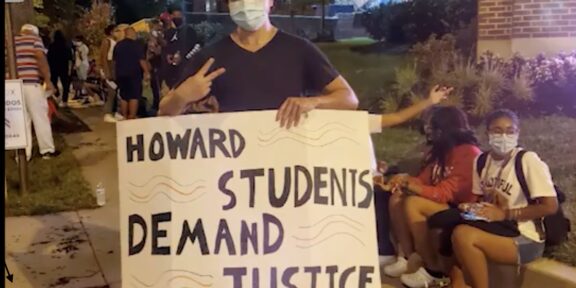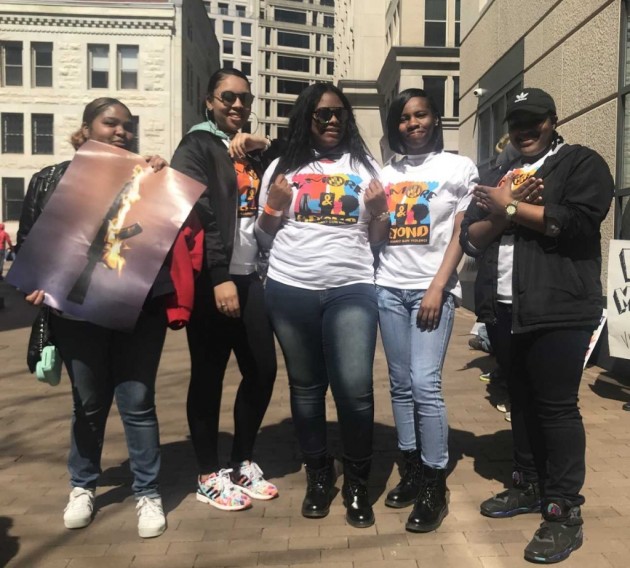Alternative Spring Break

Howard University Students loaded water the university donated to Flint residents into the backs of passing cars to help during their water crisis as part of their Alternative Spring Break helping the city. More than 40 students are in the city for a week to work with residents and schools. All photos by Howard University Students
FLINT, Mich. –Like thousands of other college students, Jaquan Blackwell spent last spring break at the beach, his on the shores of Panama City Beach, Fla., indulging in “too much drinking” and partying with hundreds of other students into the early morning.
This year, Blackwell, a junior at Howard University, was getting soaked Monday by a chilly Flint rain as he and a dozen other Howard students manned the corner of Fifth and Martin Luther King avenues to help residents struggling with the city’s water crises by loading cases of donated water into the backs of cars.
And as he placed water into a crowded minivan, he was smiling.
“I’m not missing Florida,” the New Yorker said. “I can go anytime. That costs me money. I’m here for free,

Residents are using bottled water because the city's drinking water
supply is contaminated. Howard students pitched in to help.
giving back.”
Blackwell is with Howard University students and advisors in Flint as part of the school’s annual Alternative Spring Break (ASB) program, during which students forgo the fun and sun to help others.
This group chose to work in the city that has been in the news since January because state and city officials exposed residents to dangerous water when they switched the city’s water source to save money.
The drinking water contamination began in April 2014 when the city changed its water source from the Detroit Water and Sewage Department to the Flint River, which city officials failed to treat with corrosion inhibitors.
Lead from aging pipes leached into the water supply, causing elevated levels of the metal in drinking water and creating serious public danger. The local United Way estimates that between 6,000 and 12,000 children have been exposed to water with high level of lead.
In January, the city declared a state of emergency and soon after President Barack Obama declared it as a federal emergency.
More than 450 other Howard students are doing similar service projects in 10 other sites, including Detroit, Memphis, Chicago, Newark, N.J., Atlanta, Baltimore, Washington, New Orleans, St. Louis and Haiti.
On their first work day here, the students visited high schools and later distributed water at the downtown

While these Howard students distributed water, others were working
with students in the local schools. The students will be in
through Friday helping with the city's water crisis.
mosque, the Muslim House.
“This crisis has been going on for two years and distribution has only been going on for two months,” said Blackwell said as another vehicle pulled up to receive a case or two of water. “Any change is a big change.”
Students rushed to pack the back seats and trunks of waiting vehicles with as much water as they requested, though they had limited supply.
Cars casually pulled up behind one another with their trunks opened, waiting their turn. The Howard students moved swiftly in teams of two to load each car.
“Thank you for bringing down the water,” yelled one resident from her car as she drove off.
Normally, the water is collected for distribution from other mosques around the country, but today’s water was courtesy of Howard University.
The mosque’s Imam, Hanafi Malik, said during normal water distribution they typically give about five cases per car, but a delay in shipments left available stock limited.
Ironically, the mosque is just two blocks from a fire station, an official site for water and filter distribution. At the fire station, residents can only receive two cases.
The Muslim House began distributing water six months ago, before official water resource sites were established, Malik said.
“We recognized what was going on for a while,” he said. “Everybody knows us.”
Flint is ASB’s newest site and organizers only had a few weeks to prepare.
“There’s been an interest in Flint for ASB since the water crisis broke news,” said Joshua Narcisse, a Howard senior who helped coordinate the students’ transportation, housing, food and activities. “ASB wanted to be more responsive to new events.
“The water crisis shined a light on some big issues that were already here, that need to be addressed with the same urgency.”








